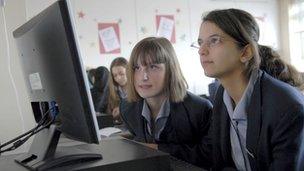Computer science part of English Baccalaureate
- Published

Computer science will now become part of a group of core subjects measured in league tables
Computer science is going to become part of the English Baccalaureate - one of the measures used in school league tables in England.
It will be included as one of the science options that count towards this measure.
The English Baccalaureate (EBacc) requires pupils to get good GCSE grades in English, maths, sciences, history or geography and a language.
Technology firms have been calling for a bigger role for studying computing.
Microsoft's education director Steve Beswick welcomed the announcement as the "start of a journey" in changing how computer science is taught.
He wants the subject to be taught to even younger children, including in primary school.
A Google spokeswoman said this "marks a significant further investment in the next generation of British computer scientists".
Core subjects
The decision by Education Secretary Michael Gove will mean that computing will count as a science in the English Baccalaureate for secondary school league tables from January 2014 - alongside physics, chemistry, biology and pupils taking double science.
The Department for Education says the change is intended to reflect the "importance of computer science to both education and the economy".
In January 2012, Mr Gove announced he was replacing the information and communications technology (ICT) curriculum in schools with a more challenging computer science curriculum, developed to meet the needs of technology firms.
In October, a panel of technology experts, including representatives of Google and Microsoft, called for the inclusion of computer science in the English Baccalaureate.
The English Baccalaureate was introduced as a measure of school performance, appearing in league tables, and showing the proportion of pupils achieving GCSEs grade C and above and some AS-levels in specified key subjects.
The planned changes in qualifications in England will see some of these core subjects becoming English Baccalaureate Certificates, replacing the current GCSEs.
There have been several lobbying campaigns to add further subjects to the English Baccalaureate - including arts and religious education - with concerns that subjects outside this group could be marginalised.
Computer science will be the first extra subject to be added.
The subject is being offered by exam boards including OCR, AQA and WJEC.
AQA's first cohort will take the exam in summer 2014 - with 231 schools signed up to teach the subject. OCR introduced the subject in 2010 with a first 50 candidates taking the exam in 2011. This had risen to 2,000 candidates for the subject in summer 2012.
WJEC's GCSE computer science course was available for teaching from September 2012.
Alongside sciences, the English Baccalaureate comprises English, maths and humanities - which is a choice of history or geography - and a language.
Languages can be either ancient or modern, drawn from a list of 172 course options, ranging from classical Greek to Japanese and Urdu.
The introduction of computer science prompted arts campaigners to call for a further widening of the English Baccalaureate.
Deborah Annetts, chief executive of the Incorporated Society of Musicians, called on the government to address "the needs of the creative economy and introduce rigorous creative subjects".
Stephen Twigg, Labour's education spokesman, said: "Adding computer science into the EBacc is too little, too late. Gove's exams still place no value on creative subjects like art, music and drama, and no value on practical subjects like engineering, design and technology and construction."
A Department for Education spokesman said: "We need to bring computational thinking into our schools. Having computer science in the EBacc will have a big impact on schools over the next decade.
"It will mean millions of children learning to write computer code so they are active creators and controllers of technology instead of just being passive users."
- Published11 January 2012
- Published15 March 2012